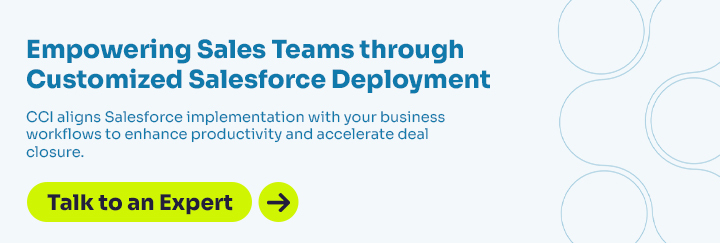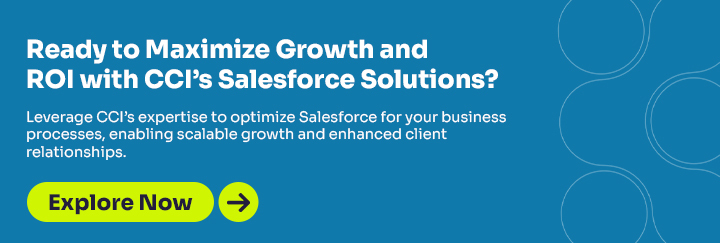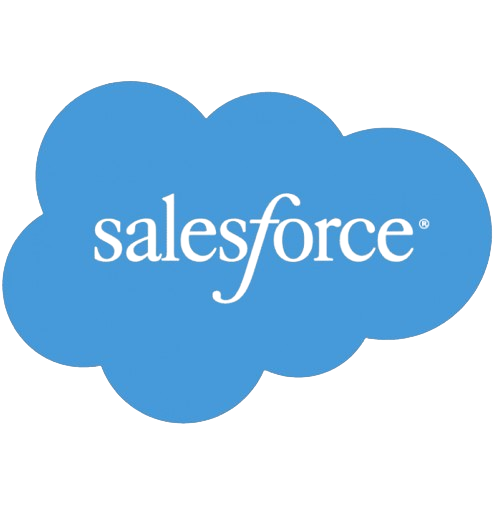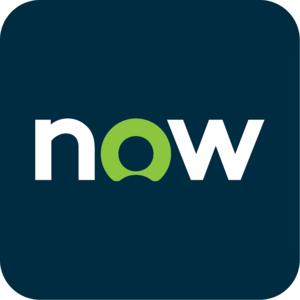AI in Salesforce: Solutions, Benefits, Examples & Trends in 2026
Updated on March 2, 2026
In the rapidly evolving business landscape of 2026, artificial intelligence in Salesforce is revolutionizing how organizations manage customer relationships and streamline operations. At the forefront is Einstein AI, Salesforce’s integrated intelligence layer, which leverages machine learning, natural language processing, and generative AI to deliver predictive insights, automation, and personalization across sales, service, and marketing functions.
Almost 85% of enterprises are adopting AI to enhance efficiency. Salesforce AI empowers small and medium-sized businesses (SMBs) and enterprises to stay competitive.
What is AI in Salesforce?
Artificial intelligence in Salesforce refers to the Einstein AI suite, a powerful set of tools embedded within the Salesforce platform to enhance CRM capabilities. Introduced in 2016 and expanded with Einstein GPT in 2023, Einstein uses machine learning, natural language processing, and generative AI to analyze CRM data, delivering predictive and automated solutions tailored to business needs.
Unlike standalone AI tools, Einstein is deeply integrated with Salesforce data, ensuring relevance and security through the Einstein Trust Layer, which prevents sensitive information from entering large language models (LLMs), as outlined in Salesforce’s 2024 AI documentation. For SMBs, Salesforce AI automates routine tasks and paves the way for agentic AI, autonomous agents that act on behalf of users.
>> Related Post: Top 5 Salesforce Best Practices to Boost Your CRM Efficiency in 2026
Salesforce AI Solutions and Features
Salesforce AI, powered by Einstein, offers a robust set of features designed to optimize sales, service, and marketing processes. Below, we detail key solutions and their features, based on Salesforce’s 2024 Einstein documentation:
1. Einstein Lead and Opportunity Scoring
- Features: Machine learning algorithms assign scores (1–99) to leads based on conversion likelihood, analyzing historical data and interactions. Opportunity Scoring evaluates deal health, identifying risks and opportunities.
- Solutions: Integrated into Sales Cloud, this automates lead and opportunity prioritization, reducing manual effort for sales teams.
2. Einstein GPT for Generative AI
- Features: Generates personalized content such as emails, summaries, or responses using CRM data, driven by natural language prompts.
- Solutions: Available in Unlimited Editions, it supports conversational interfaces across Salesforce apps, enhancing user engagement.
3. Einstein Case Classification and Reply Recommendations
- Features: AI classifies cases by urgency, analyzing sentiment and keywords, and suggests context-aware replies to streamline support.
- Solutions: Embedded in Service Cloud, it accelerates case resolution with a helpfulness rate.
4. Einstein Article Recommendations
- Features: Suggests relevant knowledge base articles based on case data, requiring at least 100 articles for optimal performance.
- Solutions: Enhances self-service capabilities in Experience Cloud, reducing support queries.
5. Einstein for Developers (Code Generation)
- Features: Text-to-code and text-to-flow capabilities generate custom workflows and apps, simplifying development.
- Solutions: Boosts productivity in AppExchange development, with a 52% code acceptance rate.
6. Einstein AI Search
- Features: Provides actionable answers from natural language queries, improving self-service across platforms.
- Solutions: Integrated across Salesforce clouds, it enhances employee self-service efficiency by 14%.
7. Einstein Copilot
- Features: An AI assistant that automates tasks like email drafting, data entry, and workflow execution.
- Solutions: Embedded in workflows, it offers proactive support, streamlining operations.
>> Related Post: Salesforce Service Cloud Einstein AI: Features, Benefits & Pricing
Benefits of AI in Salesforce
Artificial intelligence in Salesforce delivers transformative value, enhancing efficiency and customer experiences.
1. Increased Productivity
Einstein automates repetitive tasks like lead scoring and content generation, freeing sales and service teams to focus on high-value activities, saving the user’s time.
2. Cost Savings
By deflecting 30% of support tickets through self-service and reducing manual processes, Salesforce AI lowers operational costs significantly.
3. Enhanced Customer Experience
Personalized interactions powered by Einstein GPT, such as tailored emails or case responses, improve customer satisfaction and foster loyalty.
4. Data-Driven Decisions
Predictive analytics from Einstein enhances forecasting accuracy, enabling better strategic planning and resource allocation.
5. Scalability
Low-code AI tools allow SMBs to implement advanced features without heavy investment, supporting growth in competitive markets like London.
6. Compliance and Security
The Einstein Trust Layer ensures GDPR compliance by safeguarding sensitive data, reducing regulatory risks.
AI Trends in Salesforce for 2026
Emerging trends in artificial intelligence in Salesforce include:
1. Agentic AI: Autonomous agents like Agentforce handle complex tasks independently, transforming workflows.
2. Sustainable AI: Energy-efficient models align with global sustainability goals.
3. Multi-Modal AI: Combining text, image, and voice inputs for richer customer interactions.
4. Integration Focus: Unlocking AI potential through seamless data connectivity with platforms like SAP.
5. Ethical AI: Prioritizing transparency and responsible AI use to build trust.
>> Related Post: Salesforce Sales Cloud Einstein AI: Features, Benefits & Pricing
CCI’s Role in Salesforce AI
Cloud Consulting Inc. (CCI) empowers businesses to harness Salesforce AI through tailored implementations and our Integrow platform, which integrates Salesforce with ERP systems like SAP for unified AI-driven insight.
Our services include advisory, implementation, and managed support. Contact CCI to transform your business with artificial intelligence in Salesforce.
>> Related Post: Salesforce Sales Cloud Einstein AI: Features, Benefits & Pricing
FAQs
1. How does Salesforce AI improve sales team efficiency in 2026?
Salesforce AI, through Einstein Lead Scoring, prioritizes high-potential leads using machine learning, reducing manual sorting and enabling sales reps to focus on closing deals.
2. What are the benefits of using AI in Salesforce for customer service?
AI in Salesforce, via Einstein Case Classification and Reply Recommendations, automates case prioritization and suggests context-aware responses, deflecting 30% of support tickets and improving resolution times.
3. How does artificial intelligence in Salesforce ensure data privacy for GDPR compliance?
Artificial intelligence in Salesforce uses the Einstein Trust Layer to prevent sensitive data from entering LLMs, ensuring GDPR compliance and reducing regulatory risks.
4. What role does Salesforce AI play in predictive analytics for businesses?
Salesforce AI leverages Einstein’s predictive analytics to forecast customer behavior and sales trends, improving accuracy.
5. How can SMBs implement Salesforce AI without extensive coding?
Salesforce AI offers low-code tools like Einstein GPT and Copilot, enabling SMBs to automate tasks like content creation and data entry with minimal development, ideal for businesses.
6. What are the latest Salesforce AI trends for 2026?
Salesforce AI trends include agentic AI, with autonomous agents like Agentforce, and multi-modal AI combining text, image, and voice.
7. How does AI in Salesforce integrate with ERP systems like SAP?
AI in Salesforce integrates with ERP systems via CCI’s Integrow platform, enabling unified AI-driven insights across sales, finance, and operations, as demonstrated by a client’s streamlined workflows.
8. How can businesses in London leverage Salesforce AI for regulatory compliance?
Businesses can use Salesforce AI’s Einstein Trust Layer and compliance tools to meet GDPR requirements, ensuring secure data handling and reducing risks in regulated markets.







